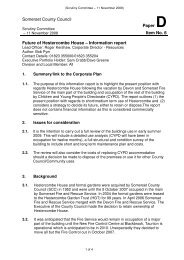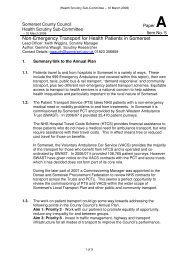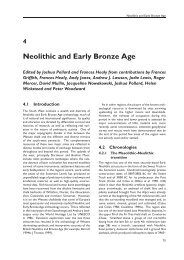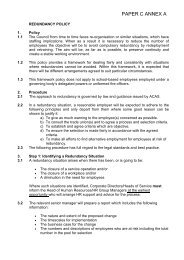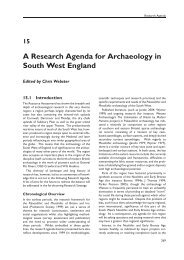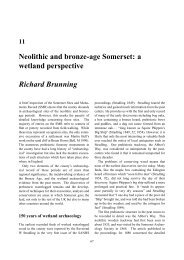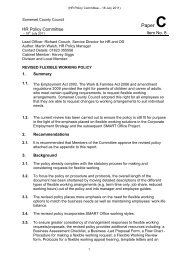Service Reviews â Outline Business Case - Somerset County Council
Service Reviews â Outline Business Case - Somerset County Council
Service Reviews â Outline Business Case - Somerset County Council
Create successful ePaper yourself
Turn your PDF publications into a flip-book with our unique Google optimized e-Paper software.
(Cabinet – 2 May 2012)<br />
• The service provider carries out the “essential” part of its activities with the<br />
contracting authority. Legal advice received is that this would represent<br />
approximately 95%.<br />
• The authority exercises the same kind of control over the service provider as it<br />
does over its own departments. This means that control would need to extend<br />
beyond the <strong>County</strong> <strong>Council</strong> simply maintaining a shareholding, and would<br />
preclude the external organisation subcontracting without careful consideration<br />
of the legal implications of doing so on both a case-by-case and cumulative<br />
basis.<br />
• There is neither private sector ownership of the service provider, nor any<br />
intention that there should be any.<br />
Legal advice obtained in 2010 and updated in 2012 (see Appendix D) indicates<br />
that any services purchased by the customer through a direct payment would not<br />
be considered to have been purchased by the contracting authority due to the<br />
introduction of a third party (the customer). This would mean that any significant<br />
expansion of direct payments in <strong>Somerset</strong> would impact on the viability of the<br />
provider and/or trigger a competitive procurement, as it could not undertake more<br />
than 5% of its business in this way, without risking legal change and potential<br />
compensation.<br />
Although the establishment of the organisation itself would have relatively limited<br />
costs associated with it, the process of awarding the contract would be likely to<br />
attract significant legal costs in order to ensure that SCC did not leave itself open<br />
to legal challenge and potential damages. The cost for a similarly sized <strong>County</strong><br />
<strong>Council</strong> to create a similarly sized organisation providing social care services was<br />
approximately £600,000. However we have no information regarding the make up<br />
of this figure.<br />
3.3.2 Benefits<br />
• During the initial meetings with carers they expressed an overwhelming<br />
preference for a transfer to a “not for profit” organisation, should the service not<br />
be retained within SCC. This option would therefore be potentially less likely<br />
(than an outsourcing approach) to encounter resistance from carers, and other<br />
stakeholders.<br />
• This can be implemented as part of a phased approach, allowing SCC to better<br />
manage risk through the transition phase. The first phase would involve setting<br />
up a local authority controlled company. During this phase, the new<br />
organisation would develop internal infrastructure and consolidate its financial<br />
and legal position. Following the expiry of the initial contract period an open<br />
market tender exercise would need to take place for the service to move<br />
outside of the limitations imposed by complying with the Teckal exemption.<br />
• This would allow the LDPS the potential to build a strong brand identity and<br />
reputation ahead of any open market tender exercise.<br />
• This would allow the LDPS to further develop a user centred and outcome<br />
focussed service delivery approach, in line with customer and commissioner<br />
expectations ahead of any open market tender exercise.<br />
A - 23




